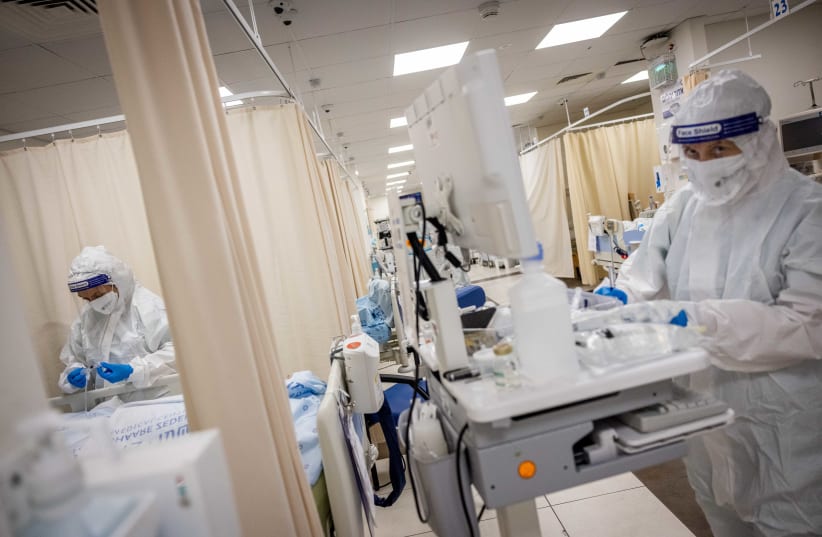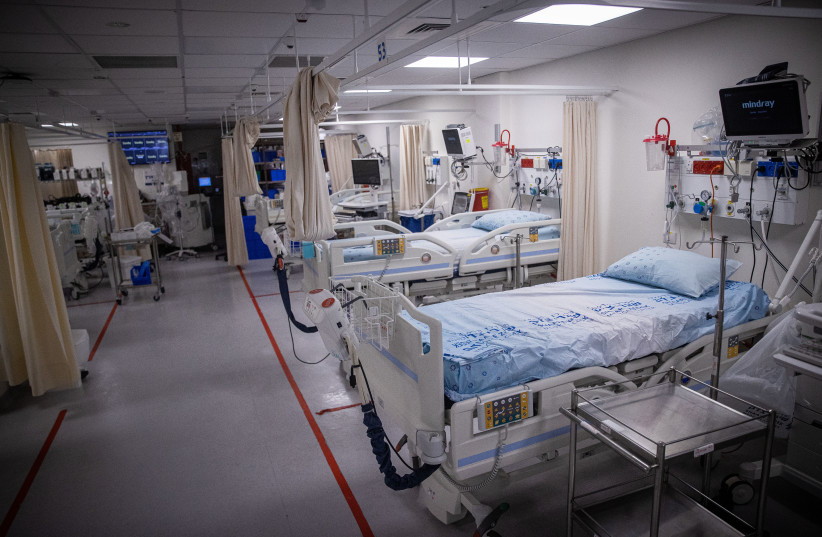Thirty Israelis were reported to have died of COVID-19 between Friday morning and Saturday night, the Health Ministry showed, as the fourth wave continues to surge across the country, striking hardest young, unvaccinated citizens. Nonetheless, the coronavirus cabinet is unlikely to meet until Wednesday.
There were 7,641 people reported to have died from the virus as of Saturday night and 7,611 as of Friday morning. In total, 535 people have died since the start of September – twice as many as had died in the four months from April through July when only 266 people died of the virus.
Some 627 people died in August. Last September, 651 people died. The month with the highest number of deaths was January 2021, when 1,444 Israelis succumbed to COVID-19.
Researchers from the Hebrew University of Jerusalem, who have been advising the government since the start of the pandemic, shared a report on Friday that they presented to Prime Minister Naftali Bennett, in which they predicted a continued decline in the infection rate.
They also predicted that the number of serious cases would decline, but that it would take another week or two before this decline was felt in the country’s hospitals. They said that since serious cases tend to be younger people and the unvaccinated, they are hospitalized for longer periods of time and are therefore crowding the country’s intensive care units.
“The virus is progressing through the unvaccinated population or those whose vaccination has expired,” the researchers wrote.
There were 694 people in serious condition Saturday night, among them 221 who were ventilated – the highest number since March.
On Friday, there were 41 COVID-19 patients connected to heart-lung ECMO machines, the majority of whom were unvaccinated, according to the Health Ministry. There was not a single person who was vaccinated with a third coronavirus shot connected to an ECMO machine.
Two of these young people were unvaccinated young expecting women, ages 20 and 27, who are hospitalized at Hadassah-University Medical Center in Ein Kerem, in serious and critical condition.
Due to the serious nature of their conditions, they were forced to deliver their babies early, at weeks 28 and 27 respectively.
The 20-year-old is intubated in critical condition and the 27-year-old is in serious condition and receiving respiratory assistance. Both babies, born so long before their due dates, are being treated in the hospital’s preterm neonatal intensive care unit.
“The next few weeks will be critical,” a spokesperson for the hospital told The Jerusalem Post.
Also at Hadassah, two young children ages six months and two years were in serious condition with the virus on Friday. Both of them suffer from severe underlying medical conditions.
The hospital said it was treating 50 COVID-19 patients in its two coronavirus internal medicine wards, two coronavirus intensive care units, and its coronavirus pediatric intensive care unit. Twenty of the patients were ventilated in critical condition, including two 40-year-olds who were hooked up to ECMO machines.
Some 4,932 new cases were diagnosed on Friday, the Health Ministry announced Saturday night. The positivity rate on Saturday was down to 4.30%, out of around 121,000 tests administered – in line with Hebrew University predictions.
The National COVID-19 Experts Committee warned the government last week that its policy of relying on a third booster shot and minimal economic restrictions is not proving itself. They also said that Israel, like other countries, is likely to be faced with the tragic dilemma of prioritizing young patients in need of critical care for coronavirus or other ailments over senior patients and called for a change in policy.
Nonetheless, the coronavirus cabinet is not expected to meet until at least Wednesday, when Prime Minister Naftali Bennett returns from his visit to New York for the United Nations General Assembly. The majority of cabinet ministers are reportedly against adding any new restrictions, mainly because the Green Pass policy is already being adjusted next week, on October 3, and they want to see if it will have any impact.
The Hebrew University researchers said that returning to routine in October after the holidays could lead to an increase in infections. But, like the ministers, they expressed some optimism that when the Green Pass is adjusted to only include those who are fully vaccinated or recovered (within the last six months or with a booster shot) then the country could and should see the significant reduction in infection that it is waiting for.

